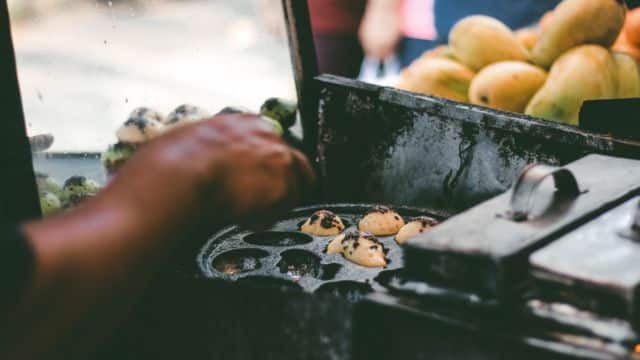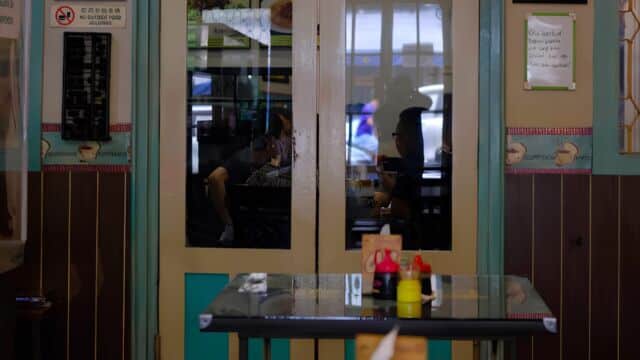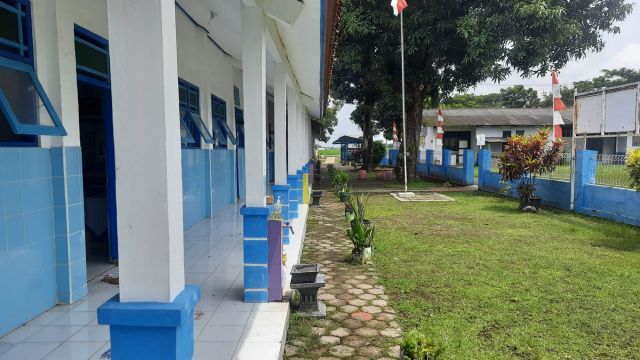A Poetry-Filled Digital Detox, in a Lombok Alley
AkarPohon | 2,000 words | Translated from Bahasa Indonesia by Sarah Leys
I want very much to have a good reason for why I’m taking so long to find AkarPohon – where I have an arrangement with Kiki Sulistyo to discuss my poetry – by blaming it all on GoogleMaps. But fine, I’ll just admit it. I’m one of those people who gets easily lost.
I should be able to find this place without issues because it’s not so far from my old college campus, Universitas Mataram-UNRAM. I’d assumed it was near the kost student boarding houses scattered along the main road. Ah, no problem, I’ll find that easily, I had thought. I had been wrong. I had forgotten that maps and I are not good friends.
I stop my motorbike in front of a convenience store and look around. I haven’t visited the campus or its surrounding area in over 10 years. I see that now there are far more coffee shops, food courts, and new restaurants all up and down this road – even a new hotel.
I rummage around for my phone, which I’d placed in my backpack, thinking how lucky the college students of today are. Back when I was at college we had to be content buying kopi tubruk, where boiling water is poured directly and unfiltered onto coffee grounds, or chilled young coconuts at the basic warung stalls that lined the roadsides. Our background music was the sounds of vehicle traffic passing or shrill-voiced buskers.
But here now are a real assortment of good cafes and restaurants. Want to do your college assignments with your boyfriend or girlfriend while listening to jazz? There are several coffee shops to choose from. Want a good lunch while awaiting your afternoon classes? There are places that can indulge your desire for eastern or western cuisine, offering a spectrum of food from light snacks to full meals, all tantalizing. I open GoogleMaps. Oh, honestly. My phone battery is down to 10 percent. Another little while and kaput.
The one and only solid thing I’ve got to guide me is that AkarPohon is located in Metro Alley, Kekalik Jaya. Hmm, Kekalik, I think. As I recall, that area produces a lot of traditional tofu and tempeh. The blue arrow of GoogleMaps directs me to take Swakarya Road. Obediently I go along with this, but it leads to me veering in and out of a series of small lanes full of vegetable sellers. The traders are enjoying themselves chatting. The vegetables displayed are semi-withered.
I go back and forth up and down a series of narrow alleys. Several college students are hanging out in front of their kost accommodation and playing guitar, while other people are busy shopping at the vegetable stalls. I also go past several houses where making of tofu is going on. This isn’t right, I think. I should have seen Metro Alley by now. Who knows if I made a wrong turn or had just been daydreaming at the wrong time. Quickly I check my phone again, but the screen goes dark, then dies totally. Brilliant.
Finally, I decide to retrace my steps and return to the convenience store of before. For God’s sake. Where is Metro Alley? I regret not asking Kiki beforehand. All because of prestige. I’m Lombok born and raised: I ought to know my way around the city of Mataram.
My fantasy changes backdrop: now I’m being invited to read out my poetry at various prestigious forums. Here i come, TED talks. Perhaps I’ll need to buy a new pen to complete all the book-signings for my legions of fans.
At this moment of annoyance with myself, a middle-aged woman passes by, and I ask her where Metro Alley, Kekalik Jaya is. Her forehead wrinkles.
‘Metro Alley? Oh, to get there you go via the TV station, Mbak’, she says. Seeing the blank expression on my face, she asks: ‘You know where the TV station is?’ I shake my head. She points. ‘One large alleyway on from here. It’ll be on the left. You enter it, go straaaaaaaaight until you get to the TV station. Then from there, you turn right. That’ll be it – Metro Lane’.
‘A big lane on the left, go straight, then after the TV station turn right?’ I say to confirm, my hand making an accompanying zigzag through the air. She nods, gives a thumbs-up. I smile widely, say thankyou. This older lady, who is wearing a sarong, has just given directions more helpful than GoogleMaps.
I’ve already had this sort of thing happen to me several times, maybe because lots of streets and small alleys in Lombok are rarely given formal names, so don’t get recorded by the satellites. Or maybe I’m just unlucky. Who knows. What’s clear is, the old lady’s instructions might allow me to save face.
Finally, after doing everything the lady had said, and being accosted by a dog barking noisily from a house, I find Metro Alley. I drive my motorbike past vacant land with scattered banana trees, then turn right – the only turn in this small lane. The houses here have high walls and closed gates. Except for one house, whose iron gate is half-opened.
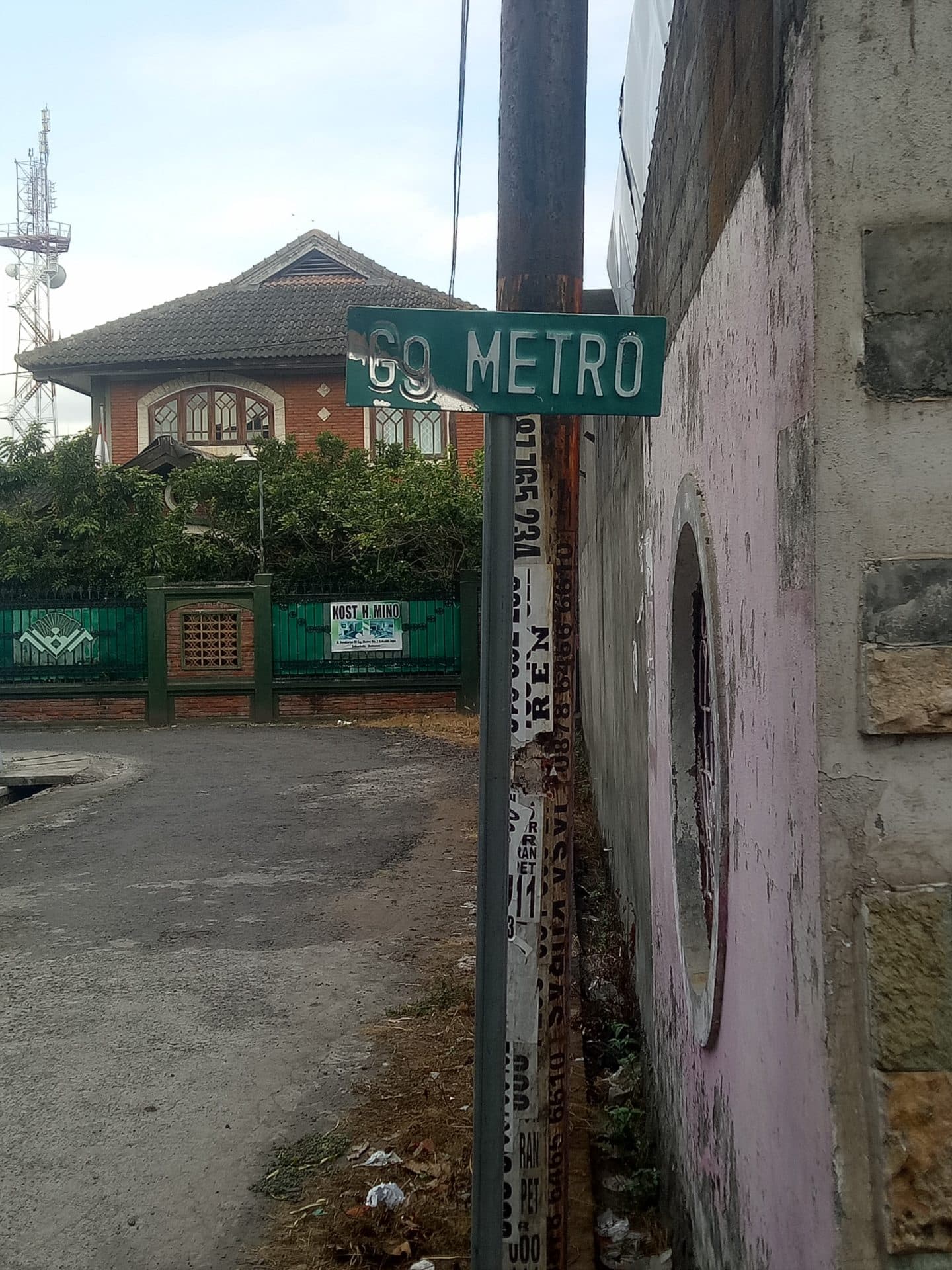
The gate looks like it might fall over any minute. Inside I can see weeds growing in various parts of the yard, with one or two ornamental plants poking out from this overgrowth. I almost go past it, but my eye catches a wooden placard on the wall. If I’m not mistaken, I see a symbol like a letter A, but without the middle dash. I stop my scooter, then on foot take several steps into the narrow yard beyond the gate. Instantly I feel relieved because I see a wooden placard that says ‘AkarPohon’. Phew. Thank God. Hopefully Kiki’s still here.
Kiki Sulistyo has played a large role in encouraging and stimulating a literary culture in Lombok, often acting as a mentor for writers here. The two of us met years ago, at a restaurant. We had merely had a regular chat, together with other friends, about writing. But after I sent him several of my poems, Kiki pushed me to write more, enough for a book. He also offered himself as an editor of the book. After sending through my final draft, I’ve been waiting with baited breath for his feedback.
This meeting today is very important to me. I’m curious – I badly want to know – whether my writing can find an audience with significant numbers of people aside from my close friends from college all those years ago.
Talking through my poetry with Kiki today ought to give some indication of whether the literary world is going to open or close its doors to me.
The door of this house, at least, has opened a little now that I’ve arrived, and after I call out an assalamualaikum, Kiki comes out and invites me in. His hair is still long, down to his shoulders, just like when I met him that first time. I follow him inside.
This house doesn’t appear especially different from all the regular residential homes around us. There’s a tiny room off to the side as I enter, although its contents consist of several wooden boards that have been nailed to the wall to display various works of literature. Several framed certificates from Kusala Sastra Khatulistiwa, a major Indonesian literary award, are also lined up on one of the makeshift shelves.
We head to the living room, and sit on a large mat there. The mat has several holes so that small parts of the tiled floor underneath are visible. Lots of strands of the mat have come loose and are dangling in all directions.
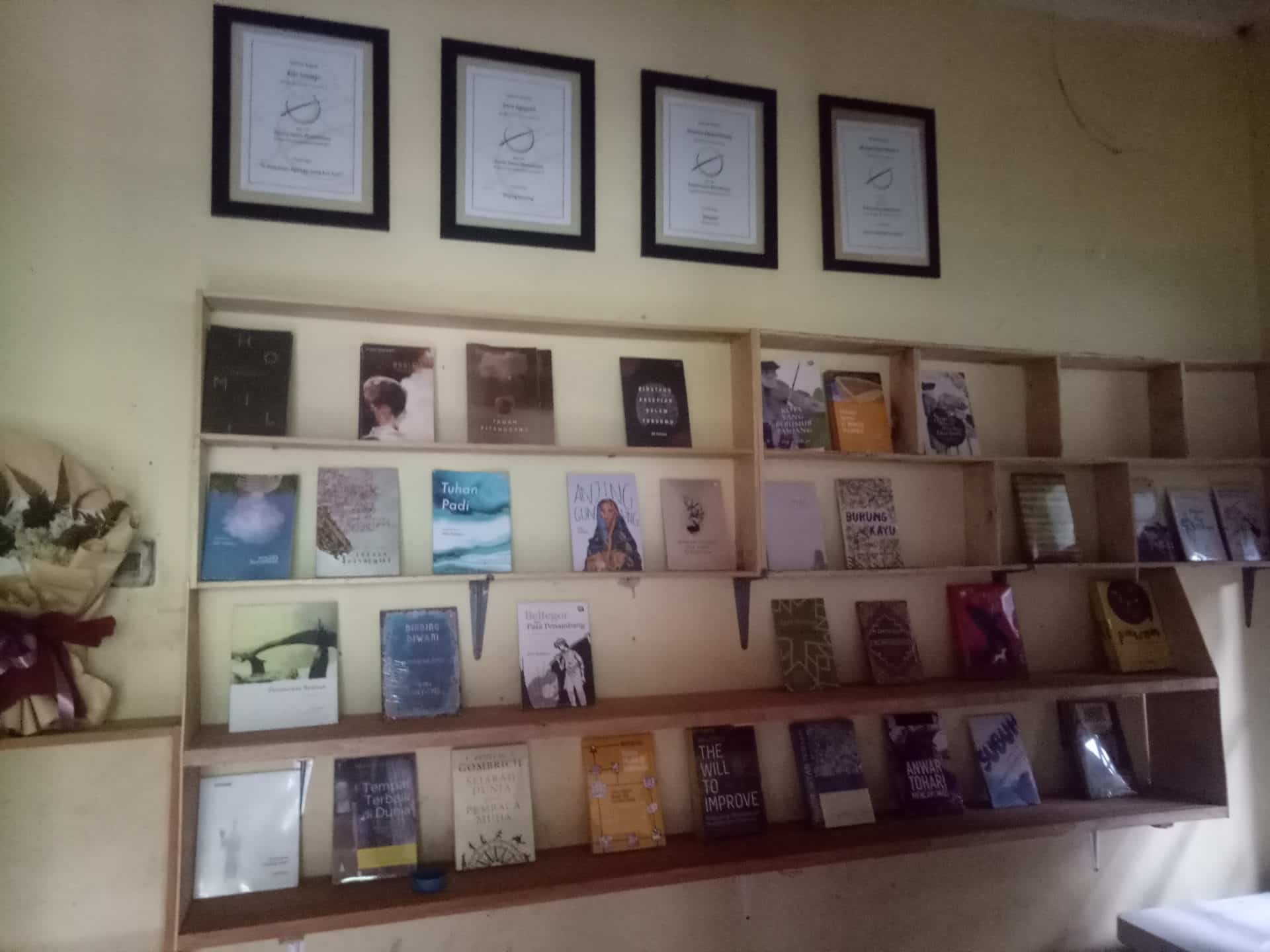
After asking each other’s news, Kiki reaches for a paper-wrapped food parcel that’s in front of him.
‘Want to eat something, Julia?’ he offers. It seems he’s yet to have lunch. Kiki mumbles an apology then opens up the packet full of rice and various sides. I shake my head and smile. ‘Go ahead, Mas. I already ate earlier at work’, I say. Even though today I’ve only drank coffee and water because I forgot to bring my lunch with me from home, and I’m always reluctant to order food delivery.
I am luckless in matters of ordering food through online apps. It’s not just that, even with the delivery fee included, my order often turns out more expensive than I thought, but often, the food that arrives is greatly at odds with my expectations. On the apps, the photos of food displayed have large portions, really truly tantalizing. But what often arrives is a chunk of hard rice that needs drinking water poured onto it before it can be swallowed. And the portions? Toddler-sized.
But all matters of online communication are a little like that for me. I prefer to meet face-to-face rather than through emails that are sometimes answered and sometimes not. So I’m happy indeed to have this opportunity today to talk directly.
Kiki, eating with his hand, pinches some of his sambal tempe and mixes it with the rice. I don’t want him to feel like he’s being observed while he’s eating. Or more precisely: I don’t want him to guess that I’m hungry. Scrolling on Instagram would be very useful right now, but with sadness I recall my phone’s hurried death before I arrived. Thanks again, GoogleMaps. So instead, I look around, observing the contents of this space while occasionally drinking from my tumbler.
Doors to several rooms are open. One of them seems to have been made into a library and archive, being crowded with books thick and thin, and great volumes of papers piled onto several shelves. In one corner of the room nextdoor to that one, a pile of newspapers forms a hillock.
But if one was to merely glance at this space, it wouldn’t be obvious that it’s one of the most active literary centres in Mataram, that has helped to produce lots of young Lombok writers and to publish and celebrate their works.
Curtains that have been drawn over several of the windows in this living room are waving slightly in a breeze. On the wall are several geckos who are making noise, as if in active dialogue with one another. Their tails are knocking gently against the wall. Seems that a really thrilling conversation is underway in Bahasa Gecko.
Observing them, I start to imagine what sort of dialogue will come forth from Kiki after he’s done eating.
Maybe something like this:
‘Outstanding Julia! Your writing is just fantastic. Ten out of ten! I have no doubt you will be nominated for the next Kusala Sastra! My goodness, where have you been all this time?’ In my head, this dialogue is packaged into transparent balloons that rise gently into the air before a sunray appears and causes them to glitter brilliantly, like in those soap ads on TV.
My fantasy changes backdrop: now I’m being invited to read out my poetry at various prestigious forums. Here I come, TED Talks. Perhaps I’ll need to buy a new pen to complete all the book-signings for my legions of fans. A pen that’s more expensive, so that my signature looks thicker and more imposing. I’ll likely also have to buy a stylish dress – who knows, there might be a photo shoot. I smile to myself. Ah, how beautiful, how delirium-inducing are my fancies.
‘I read all your poems’, says Mas Kiki, obliterating my daydream. ‘Not bad. If I was to give them a score, I’d probably give a six and a half’. He says this while folding up the paper that had contained his meal, which he has finished.
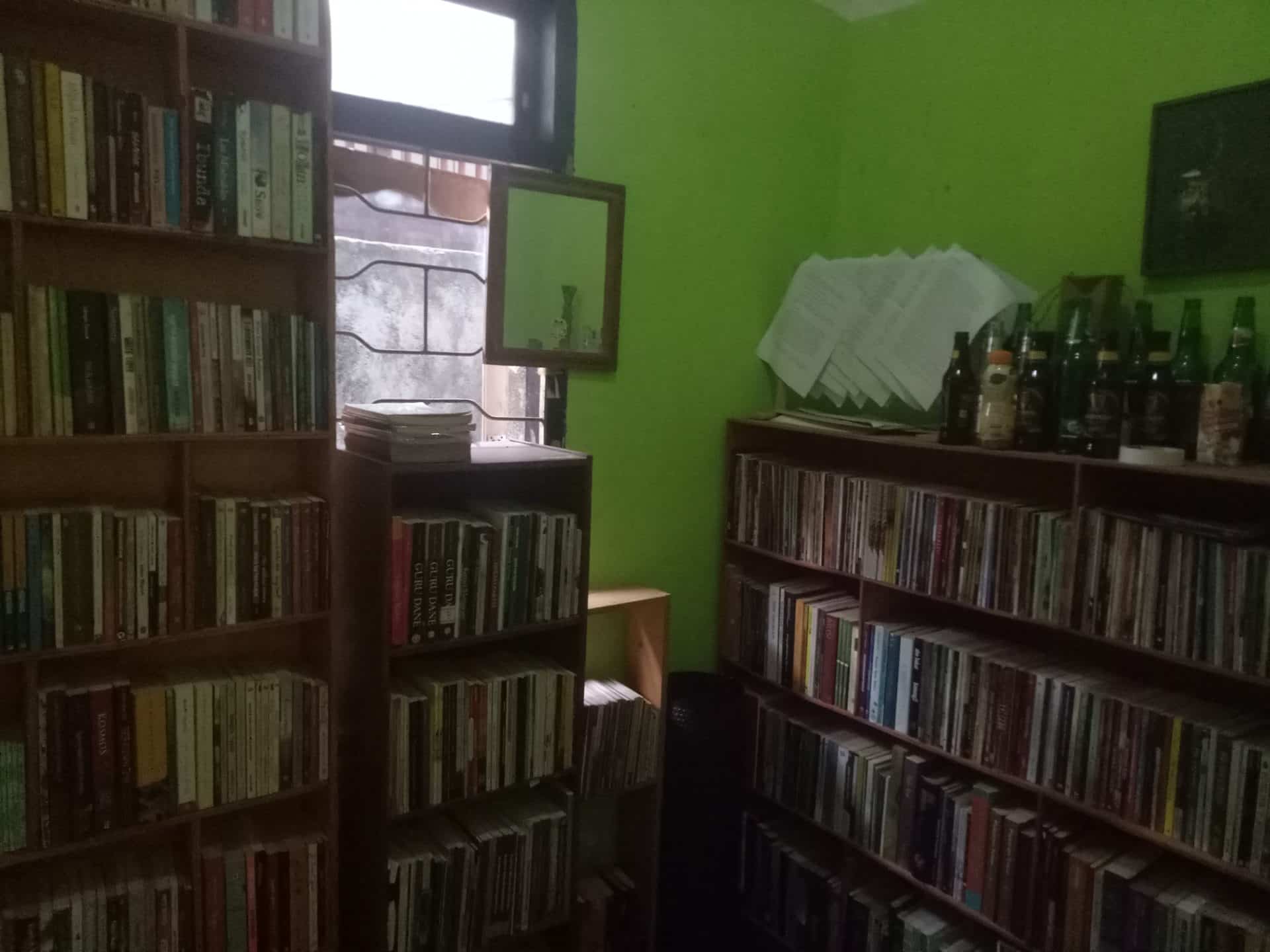
So, there it is. 6.5. Those balloons explode and deflate in the air. Goodbye, Kusala Sastra. After this, I will return to giving out my signature only on my school students’ report cards, with my ballpoint pen that costs 3,500 rupiah (20 US cents). Maybe I should be satisfied with being an elementary school teacher, as I’ve been for the last several years. It appears it will be enough for me to read out my poetry in front of Hamster Bieber, our albino class pet. All this time he has, after all, been a good listener.
Yet, I find there’s a grin on my face, too, after hearing Kiki’s opinion. At least he didn’t give me a ‘pity grade’. At least 6.5 is still above 50%. There’s still hope, therefore, that my poems maybe aren’t completely terrible. Maybe the door to the literary world is opening for me, even though it’s not yet open as wide as I wish.
After I’m given input as to what should be added to my book draft, and having a discussion about this and that, I excuse myself and make to leave.
Kiki escorts me to the front door. As I exit the house, I see it’s already late afternoon. From the seat of my scooter, I look around me again. I wish to memorize the location. I feel I will often come to this place, especially now Kiki has told me that literary discussions are routinely held here. I’m honestly ecstatic that such activities are happening in this part of Lombok: it would be a shame to miss such opportunities. I nod to Kiki, then turn on the ignition of my scooter.
This time, I don’t hurry. I drive the scooter slowly. The street-lights have started to glow. I endeavour to memorize the series of turns I have to make.
As I head towards Majapahit Road, I recall that there are several pressing tasks I should really deal with. But now, I want to have a hot latte at one of these new coffee shops. There, I will go over again the notes given to me by Kiki.
© Julia Arungan
English translation © Sarah Leys




